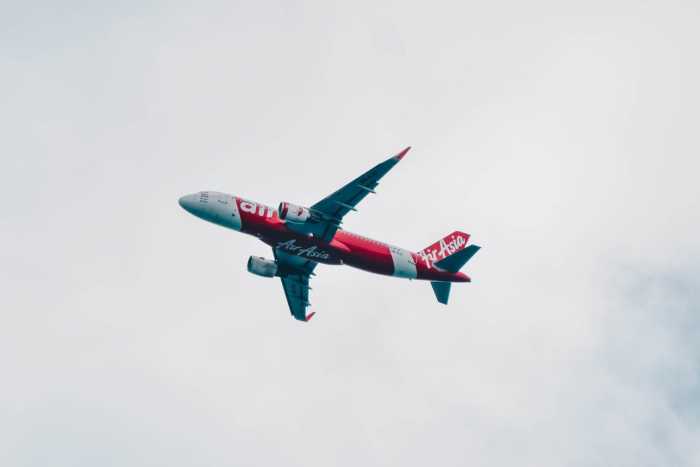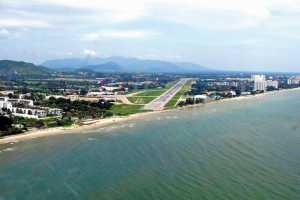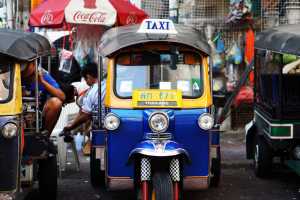
Phuket Airport Facilities
16th Jul 2010

News that Phuket International Airport's 5.70 billion baht expansion is moving ahead will delight many people as Phuket will continue to attract increased numbers of visitors in the coming years, despite political, economic and Mother Nature setbacks.
The upgrade will modernize the airport from what many people still see as a somewhat dowdy dowager in a fabulously glamourous paradise location like Phuket to raise the capacity level by 92% over the next five years to around 12 or 13 million customers.
Which is all great and very well. But it is also worth looking at what can be done to give the airport that little bit extra of value added, apart from being a gateway for most visitors to a wonderful holiday here.
Enter Airports Council International, the global body representing airports around the world. At the moment PIA does not even make the one star class on its global awards surveys. But that is nothing to be ashamed of. Many other similarly sized airports don't either.
The forthcoming upgrade, however, offers PIA a new opportunity to install some customer services that could enable it to go further up the ACI scale. Here is some research done by ACI on two key areas, provision of Internet services and baggage cart usage. Baggage carts, of course, are a mainstay of any airport'and, in the case of Suvarnabhumi Airport in Bangkok in the last couple of years, subject of considerable criticism.
Firstly the Internet. With up to 12-13 million customers over the next five years, PIA will have to meet the demand of Internet users, even if people are still on holiday. To put it in perspective, ACI estimates that over nine billion passengers will use the world's airports by 2025, up from 4.4 billion in 2006. That is a lot of Internet users when you consider a country like Indonesia, where English is still a very poor second language, is the third largest Facebook market in the world and about to pass the United Kingdom to become the second largest after the United States.
And considering Phuket attracts huge numbers of tourists from the likes of Japan, China, Korea and Malaysia, it is worth noting that as of 2009 China has 384 million Internet users, Japan 96 million, India 81 million, Korea 37.5 million and Malaysia 16.9 million. Oh, and don't forget Thailand with 16 million.
This is what an ACI survey of airport wi-fi around the world found:
' 96 percent of airports provided wi-fi.
' 73 percent had global coverage.
' 90 percent of of wi-fi was in the gate/restaurant areas, 82 percent in transit/shopping and airport lounge areas and 59 percent in the check-in area.
' 55 percent were pay per use
' 46 percent were credit card payment and a surprising 17 percent by mobile phone.
The average cost of wi-fi access is USD7.8 per hour.
Seventy percent of airports also have airport kiosks which are work stations located throughout the terminal for people without laptops.
So taking these figures into account there is some good data available for PIA to ponder when considering what level of wi-fi to install, the method of payment and locations.
Regarding baggage carts. While PIA is a small airport'a factor that is definitely in its favour with passengers used to long walks at international airports'baggage carts are particularly important in a place like Phuket where tourists tend to carry many more, and larger bags than, say, a businessman on a quick trip.
The ACI survey found 60percent of airports offer an airside cart service. It also found:
' 62 percent of carts can be used on walkways.
' 88 percent cannot be used on escalators
' 90 percent can be used in lifts.
' 44 percent of carts have a breaking system.
' 60 percent of carts have advertisement on them.
So while the walk from the baggage carousel to the taxi, or visa-versa when leaving, may not be great at PIA, use of baggage carts is quite high because of the tourist location, therefore if PIA is to radically change the layout of the terminal, use of baggage carts should get high consideration.
Finally, PIA may consider participating in ACI's Airport Service Quality survey system. This provides an impartial, unbiased, statistically reliable reflection of service levels in an airport, as experienced by the passenger ASQ is the world's leading airport benchmark programme. Suvarnabhumi Airport in Bangkok takes part in the Asia Pacific part of the ASQ programme.









